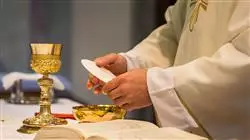University certificate
The world's largest faculty of education”
Why study at TECH?
There is no better investment than learning how to improve your educational methodology. Prepare yourself now and get the necessary skills to bring out your best version in teaching thanks to this Postgraduate diploma”

Teachers must master the subject they teach in depth and have a complete command of it. If we add to this factor the importance of faith applied to teaching, it is not only enough to have extensive knowledge, but also knowing how to assertively transmit this wisdom to their students. In this way, they encourage their passion for study and increase their curiosity, especially in early stages such as kindergarten and primary school, where this is more relevant. As in many other fields, the importance of education at an early age is fundamental, and this is where the main role of the teacher as a guide comes into play. For this reason, in recent years, schools are not only looking for religion teachers, but specialized teachers, capable of transmitting the cultural, historical, philosophical and, of course, the authentic part of the Catholic Religion.
Given the wide demand for specialized professionals in the current labor market, TECH has designed this Postgraduate diploma in Teaching of Catholic Religion in Pre-School and Primary School and Primary School to prepare teachers in the arduous task of instilling Christian ethics and values in their students from an early age. This program has been created with the best theoretical, practical and additional material, through which the graduate will be able to work in the exhaustive knowledge of the Mission of the Church. In only 6 months, the teacher will discover a revolutionary way of learning with the enrollment to this program that offers flexible study schedules and that will be available through the internet, so that his academic experience will be dynamic, as well as empowering.
A program that stands out for the most effective, simple and efficient methodology, which leads the graduates to specialize and project their professional career towards the highest level of teaching, relying on the most advanced Catholic education for infant and elementary school. In addition, it has enriched all its contents with the most complete and up-to-date information to be able to delve deeper and broaden the knowledge of the graduate who chooses this program.
Learn the keys to convey the information to your students through the appropriate language and maximize your teaching skills”
This Postgraduate diploma in Teaching of Catholic Religion in Pre-School and Primary School and Primary Schoolincludes the most complete and up-to-date educational program on the market. Its most notable features are:
- The development of case studies presented by experts in the teaching of Catholic Religion in pre-school and elementary school
- The graphic, schematic and eminently practical content of the system provides rigorous and practical information on those disciplines that are essential for professional practice
- Practical exercises where self-assessment can be used to improve learning
- Its special emphasis on innovative methodologies
- Theoretical lessons, questions to the expert, debate forums on controversial topics, and individual reflection assignments
- Content that is accessible from any fixed or portable device with an Internet connection
Increase your professional performance through this Postgraduate diploma in Teaching of Catholic Religion in Pre-School and Primary School and Primary School”
The program’s teaching staff includes professionals from the sector who contribute their work experience to this educational program, as well as renowned specialists from leading societies and prestigious universities.
The multimedia content, developed with the latest educational technology, will provide the professional with situated and contextual learning, i.e., a simulated environment that will provide immersive education programmed to learn in real situations.
This program is designed around Problem-Based Learning, whereby the professional must try to solve the different professional practice situations that arise during the academic year. For this purpose, the student will be assisted by an innovative interactive video system created by renowned and experienced experts.
Gain confidence, learn teaching strategies, and ensure that your in-depth knowledge reaches your students”

Prepare yourself with the most up-to-date multimedia materials through a methodology that allows you total flexibility in your learning”
Syllabus
The modules chosen to make up this comprehensive program are designed to elevate the skills of the conventional teacher to specialized teacher. With this program, the student will acquire the necessary competencies for the exercise of the profession in educational centers in Pre-School and PrimaryPrimary Schools in an effective manner. TECH has selected the most relevant subjects to be taught in modules that are developed in a coordinated and structured way with the objective of preparing elite specialists in the field of Catholic Religious Education. All this by means of teaching resources presented in multimedia formats that guarantee the student a rigorous learning process adapted to current educational needs.

A study program created to prepare high-level professionals through the most comprehensive syllabus and the most effective methodology"
Module 1. Religion, Culture and Values
1.1. Identity of the Catholic Religion and Morals Department
1.1.1. Nature and Purpose of School Religious Education
1.1.2. Legitimacy of Religious Education in the School
1.2. The Religious Fact in History and in the Structure of the Human Being
1.2.1. The Religious Experience: Anthropological Reality
1.2.2. The Religious Fact and its Different Social, Moral, Cultural and Artistic Manifestations
1.2.3. The Religious Fact Today. Main Religious Traditions and Beliefs Present in our Society: Christianity, Judaism and Islam
1.3. Christian Religious Fact and Culture
1.3.1. Evangelization and Inculturation of the Faith
1.3.2. The Church and Culture. The Relationship Between Faith and Reason
1.3.3. The Man in Search of God Religion and Culture
1.3.4. Christian Roots of the Spanish Culture
1.3.5. The Challenges of Today's Culture
1.3.6. The Task of the ERE: Inserting the Gospel in the Heart of Culture
1.3.7. The Influence of Christianity on our Cultural Heritage
1.3.8. The Intercultural and Interreligious Dialogue in the Construction of the Coexistence of Citizens
1.4. The Gospel and the New Evangelization
1.4.1. The Search for Meaning and the Freedom of Faith
1.4.2. The Good News in the Transmission of Culture
1.4.3. Essential Contents of the New Evangelization Applied to the School Reality
1.4.4. The Humanizing Value of the Religious Evangelization and Personal Development
1.4.5. Main Difficulties for Evangelization in the School 5. The Human Person
1.4.6. Creation: Image of God
1.4.7. Vocation: Union with God
1.4.8. The Human Condition: Sin and Grace
1.4.9. The Ultimate Meaning of Life
1.5. Initiation to the Knowledge of the Bible
1.5.1. Structure and Books that Constitute the Bible
1.5.2. Origin and Formation of the Old Testament and the New Testament
1.5.3. Most Common Literary Genres
1.5.4. The Concept of History in Judaism, Christianity and Islam
1.5.5. The Bible, Word of God
1.5.6. The Revelation of God in the Bible
1.5.7. The Bible, Human Word
1.6. Manifestation of God in the Created Work
1.6.1. God Creator and Provident
1.6.2. Narratives of the Book of Genesis on the Creation and the Origin of the World
1.6.3. The Dignity of the Human Being
1.6.4. Appreciation and Valuation of One's Self
1.6.5. Education of the Self-Esteem and Freedom
1.6.6. Appreciation and Respect for All Human Beings: The Other as a Brother and Sister
1.6.7. Relationship of Humankind with Nature
1.6.8. Cultivation of Sensitivity and Care for Nature
1.6.9. Revelation of the Salvific Truth
1.6.9.1. The Design of God on the Human Being
1.6.9.2. Humans Rupture: Sin
1.6.9.3. The Fidelity of God: Promise and Hope of Salvation
1.7. The Covenant of God with his People
1.7.1. The Revelation of God in History: Religious Significance of the History of Israel
1.7.2. Narrative of the History of Salvation in the Old Testament
1.7.3. Great Biblical Themes and Their Religious and Social Significance: Exodus, Covenant, The Prophets
1.7.4. Biblical Characters and Their Meaning in the Believing Experience of Israel and in the Christian Experience
1.7.5. Values that Stand Out in the Covenant
1.7.6. The Value of Attentive Listening
1.7.7. Promises and Commitments, their Importance in Social Life The Value of Loyalty, Responsibility, Fidelity
Module 2. The Christian Message
2.1. Jesus Christ, Full Revelation of God
2.1.1. The Gospels, Testimonies About the Life and Doctrine of Jesus: The Formation of the Gospels
2.1.1.1. Jesus of Nazareth: The Incarnate Gospel
2.1.1.2. The Four Gospels: The Written Gospel
2.1.1.3. The Apostolic Preaching: The Preached Gospel
2.1.1.4. The First Communities: The Lived Gospel
2.1.1.5. Historical Reading of the Life of Jesus
2.1.1.6. Historical and Religious Context: The Political and Religious Powers
2.1.1.7. The Expectation of the Moment
2.1.1.8. The Incarnation of Jesus and the Divine Maternity of Mary
2.1.2. The Message of Jesus: The Announcement of the Good News, the Signs of the Kingdom of God: The Parables
2.1.2.1. The Action of Jesus: Authority, Signs of Salvation. The Prayer of Jesus
2.1.2.2. Values of the Kingdom; the Beatitudes
2.1.2.3. Demands of the Kingdom: Conversion and Following
2.1.2.4. The Message of Jesus Expressed in the Cultural Classes of Today's Young People
2.1.3. Death and Resurrection
2.1.3.1. The Death of Jesus According to the Scriptures: Jesus Christ Died for Us
2.1.3.2. The First Testimonies of the Resurrection
2.1.3.3. The Encounter of the First Believers with the Risen One
2.1.3.4. The Christian Meaning of Death and Suffering
2.1.3.5. The Resurrection, the Living Presence of Jesus Christ
2.1.3.6. The Ascension of Jesus to Heaven
2.1.4. Theological Reading of the Life of Jesus
2.1.4.1. True God and True Man
2.1.4.2. Theological Significance of the Incarnation, the Death and the Resurrection
2.2. The Most Holy Trinity
2.2.1. The Mystery of the Most Holy Trinity, The Father and His Loving Care
2.2.1.1. The Son and His Self-Giving
2.2.1.2. The Holy Spirit and His Vitality
2.3. The Church
2.3.1. Foundation and Basis of the Church in Jesus Christ
2.3.1.1. Sacrament, Communion, Mystical Body. Forms of Life
2.3.1.2. Universal Sacrament of Salvation
2.3.2. The Faith of the Church in Jesus Christ: Jesus is Lord
2.3.2.1. Jesus is the Revelation of God
2.3.2.2. Jesus is the Son of God
2.4. Eschatology
2.4.1. Christian Meaning of Death
2.4.2. The Hope of the New Heavens and the New Earth: The Kingdom of God will Come to its Fullness
2.4.3. God Who Raised the Lord Will Raise Us Too (1 Cor 6:14).
2.4.4. Meaning of the Profession of Faith "I Believe in Eternal Life"
Module 3. Church, Sacraments and Morals
3.1. The Church, the New People of God
3.1.1. Presence of the Spirit and Beginning of the Church: The Apostolic Church
3.1.1.1. The Church People of God of the New Covenant. Universality and Catholicity of the People of God
3.1.1.2. The Diverse Charisms and Ministries in the Christian People. The Hierarchical Constitution of the Church
3.1.2. The Mission of the Church
3.2. Mary, Mother of God and our Mother
3.2.1. The Mother of Jesus Christ: Divine Maternity: Mary and the Spirit
3.2.1.1. Sign of the Mercy of God the Trinity. Intercession
3.2.2. Mother of the Church. Teacher and Model of Christian Discipleship
3.3. The Sacraments and the Worship of the Church
3.3.1. The Sacraments and Worship: Expression of Faith, Signs and Means of Salvation
3.3.1.1. Liturgical Signs
3.3.1.2. Sacraments and Sacramentals. Liturgical Seasons and Christian Feasts
3.3.2. The Sacraments of Christian Initiation
3.3.2.1. Baptism
3.3.2.2. Confirmation
3.3.2.3. Eucharist
3.3.3. The Sacraments of Healing
3.3.3.1. The Sacrament of Penance and Reconciliation
3.3.3.2. Anointing of the Sick
3.3.4. The Sacraments at the Service of the Community
3.3.4.1. Apostolic Ministry
3.3.4.2. Marriage
3.4. Evangelical Morality, the Foundation of Christian Behavior
3.4.1. Biblical Foundation of the Christian Ethics
3.4.1.1. The Fundamental Morality: Christian Life Project. The Fundamental Option: Christian Life Project
3.4.2. The Moral Act and the Formation of the Conscience
3.4.2.1. The Development of the Moral Judgment, the Formation of the Conscience and the Education of the Moral Sense
3.4.3. The Moral Education as a Key to the Formation of the Personality: The Moral Dimension of Human Existence
3.4.4. Moral Criteria from the Christian Perspective on Current Issues: Regarding Human Life
3.4.4.1. The Human Rights of All
3.4.4.2. Peace Ecology and Ethics Health and Quality of Life Social Justice Citizenship. Respect, Tolerance and Cooperation
3.5. The Mission
3.5.1. The Community of Believers: Ecclesial Sense
3.5.2. The Sending to Evangelize in the School: An Original Form of the Ministry of the Word
3.5.3. The Catholic Religion Teacher Makes the Church Present in the School
3.5.4. Our Proposal: A New Way of Life and of Human Relationships
3.6. The Catholic Religion Teacher
3.6.1. The Evangelizing Sense of the Teacher
3.6.2. Character and Charism
3.6.3. References and Models
3.6.4. Formation
Module 4. Pedagogy and Didactics of the Catholic Religion
4.1. Religious Psycho-Pedagogy
4.1.1. The Religious and Moral Evolution of the Child from 6 to 12 Years of Age
4.1.1.1. The Influence on the Child of the Family Environment and the Sociocultural Context
4.2. Learning to Teach the Field of Religion
4.2.1. Originality of Religious Education
4.2.2. Specificity and Complementarity with Other Ways of Educating in Faith
4.2.3. Goals and Objectives of School Religious Education
4.2.4. Basic Competencies
4.2.5. The Contributions of the New Educational Theory to the Teaching of Religion
4.2.6. The Selection of the Religion Contents: The Religion Syllabus for Pre-School and Primary School. Pre-School and Primary School Education
4.2.7. Criteria for the Sequencing of the Contents of the Field of Religion.
4.2.8. The Procedures and Strategies in the Teaching of Religion: The Methodology of Experience
4.2.9. The Evaluation of Learning in Religion and Morality
4.2.10. Materials and Resources for the Teaching of Religion-
4.3. Teaching Practice in Religious Education
4.3.1. Basic Presupposition: Teaching Contextualization
4.3.2. Basic Teaching Element: The Teaching Unit
4.3.3. Methodology for the Elaboration of Teaching Units in the Field of Religion
4.4. The Didactics of ERE
4.4.1. Curricular Approach
4.4.2. Educational Keys of the Syllabus: Sources of the Syllabus
4.4.2.1. Epistemological Reference
4.4.2.2. Psychological Reference
4.4.2.3. Sociological Reference
4.4.2.4. Educational Reference
4.4.2.5. Correlation of the Contents with the Objectives
4.4.2.6. Correlation of the Assessment Criteria with the Objectives
4.4.3. Procedures for Learning: Basic Procedures
4.4.4. Application of God's Education to the ERE
4.4.4.1. Selected Thematic Cores
4.4.4.2. Contribution to the Development of Basic Competencies
4.4.4.3. Contribution of Religious Formation to Integral Education
4.4.4.4. The Presence of the Religious in the Educational Project
4.5. Application to the Teaching of the Bible - Objectives
4.5.1. Biblical References in the Syllabus of the Compulsory Education
4.5.2. Theological Indicators
4.5.3. Basic Procedures
4.6. Application to the Teaching of the Sacraments - Purposes
4.6.1. References on the Sacraments in the Syllabus of Compulsory Education
4.6.2. Theological Indicators
4.6.3. Basic Procedures
4.7. Application to the Teaching of Catholic Morals - Aims and Objectives
4.7.1. References on Catholic Morality in the Syllabus of Compulsory Education
4.7.2. Theological Indicators
4.7.3. Basic Procedures
4.8. Didactics Applied to Values Education
4.8.1. Foundation of the Evangelical values.
4.8.2. Application of the Values to the Learning
4.9. Research in Religious Education
4.9.1. Current Lines of Research
4.9.2. Possible Future Research Paths
4.9.2.1. On Religious Education Teachers
4.9.2.2. On the Students: What They Know and What They Learn
4.9.2.3. On the Teaching Methodology

A unique, key and decisive training experience to boost your professional development”
Postgraduate Diploma in Teaching Catholic Religion in Infant and Primary Education
At TECH Global University, we present you our Postgraduate Diploma in Teaching Catholic Religion in Infant and Primary School, designed especially for teaching professionals interested in strengthening their teaching of the Catholic religion in an innovative and effective way. Join us and discover how to take religious education to a new level. Our online classes give you the flexibility to study from anywhere and at any time that fits your schedule. Take advantage of online classes to expand your knowledge of Catholic religious education and discover new pedagogical strategies that will allow you to enrich your students' educational experience. The Postgraduate Diploma will provide you with the necessary tools to develop curricula based on the fundamental values and principles of the Catholic faith. You will learn to integrate multimedia resources, interactive activities and participatory methodologies in your classes, which will allow you to capture the attention of your students and promote meaningful learning.
Become a Catholic Religion Teacher Program
In this postgraduate program, you will be supported by professors specialized in the field of religious education, who will guide you throughout the program and provide you with personalized guidance. You will be able to exchange ideas and experiences with other teachers in our online collaborative learning environment, enriching your training and expanding your knowledge. Upon completion of this program, you will be prepared to offer a more dynamic, inclusive and tailored Catholic religious education to your students. You will become a reference in religious education, providing children with a solid foundation of values and knowledge that will accompany them throughout their lives. Don't miss the opportunity to enhance your teaching of the Catholic religion at the Pre-school and Primary level. Join TECH Global University and discover new methodologies and resources to make your classes an enriching and meaningful experience. Start your path towards an innovative and quality religious education today!







